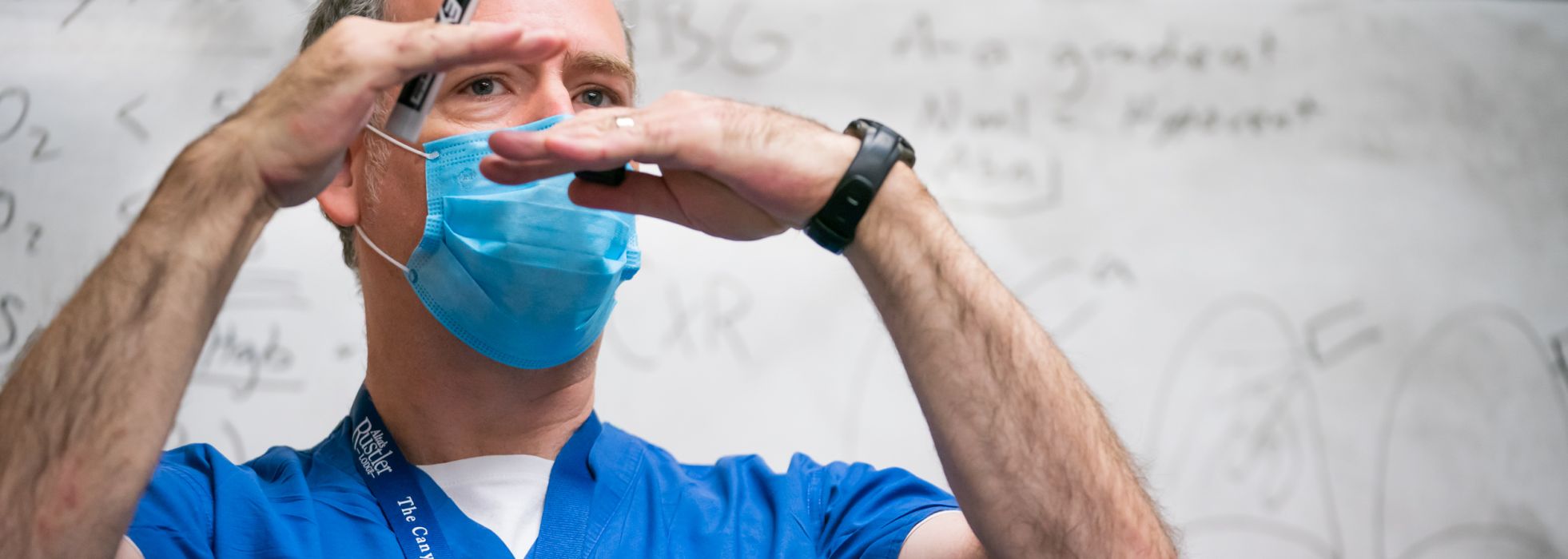A Nationally Recognized Curriculum
Our comprehensive curriculum emphasizes active learning, case-based learning, simulation and role play to stimulate a variety of learning styles.
You'll experience traditional didactic lectures given by leading experts in the field, case-based learning in large and small groups, and self-directed learning at conferences led completely by residents.
In fact, our learning environment is guided by residents' voices. You'll serve on our program committees as an agent of change, keeping our program dynamic and current. Town halls, focus groups, and direct feedback lead to program enhancements that leave a strong legacy for future generations of learners.
Curriculum Features
- Orientation
- A detailed, week-long Department of Medicine-specific orientation before the PG-1 year allows interns to get to know one another and the program leadership, and plan approaches for the first few rotations.
- Full-day professional development days before the PG-2 and PG-3 years emphasize leadership, professionalism, teaching and a positive work environment.
- Inpatient Didactic Curriculum
Didactics
- Each summer we have a focused intern lecture series to introduce interns to common problems seen on the wards and on call.
- We have a comprehensive Inpatient Lecture Series (ILS) for all residents that covers core topics relevant to the care of hospitalized patients. These lectures are live-streamed and recorded, and we have a large library of recent talks by experts in their fields.
Case-Based Learning
- We offer Morning Report twice weekly for residents on UW or VA rotations. These are interactive sessions led by our chief residents focused on building your clinical reasoning skills.
- Intern Morning Report occurs once weekly. It is an intern-only discussion, allowing for a comfortable environment to enhance learning and question-asking, and is led by the program director.
- Tissue Conference is a quarterly "unknown", case-based, clinical pathological conference given by residents, a fellow, a faculty member, and the Radiology and Pathology departments.
- M&M Conference has cases presented by well-coached interns and discussed in small group break out sessions with a focus on patient safety and a systems-based approach to improving the quality of care we provide.
Residents Teaching Residents
- Residents perform a review of the literature in their selected area of interest and give a didactic presentation of the topic to their peers and faculty in our weekly Advances conference. All residents do this during their PG-3 year, with mentorship from an experienced faculty member.
- PG-2s give a well-coached Journal Club conference.
- During the PG-3 year, all residents will give one conference on a quality improvement project that they selected and performed as part of our QI program. This faculty-mentored program assures each resident that she or he graduates with the skills needed for lifelong clinical performance improvement in patient care outcomes.
- Academic Days
- Every Friday during outpatient blocks is protected for resident learning. Didactics happen for the entire outpatient cohort throughout the day.
- The morning conferences during academic days focus on core internal medicine topics focused on building your medical knowledge and sharpening your clinical reasoning skills. These sessions are led by chief residents and program leadership and involve a mix of didactics and case-based reports.
- Our tracks and pathways have optional meetings at noon during many academic days to provide protected time to engage with your chosen pathway or area of interest.
- Afternoons in our academic days are protected for simulation exercises (including numerous sessions at our simulation center), longitudinal curricular threads (including Race and Bias in Medicine, Social Determinants of Health, and Health Policy), well-being activities and our Empathy Course, and/or professional development workshops.
- Education Innovation
- Point-of-Care Ultrasound (POCUS) workshop and clinical rotation. The four-hour session for interns includes hands-on time with the ultrasound probe and standardized patients, and practical and knowledge-based assessment. Residents incorporate POCUS skills into their evaluation of patients on wards, with guidance from well-trained mentors, using pocket and portable ultrasounds. UW and VA offer POCUS training on specific rotations.
- Intern Meriter QI rotation. All intern residents have a two-week protected block to receive training in quality improvement and patient safety, participate in a Root Cause Analysis (RCA), receive QI and leadership-related didactics, and meet with institutional QI leaders.
- PG-3 VA QI rotation. All PG-3 residents have a four-week protected block to further their quality improvement training, create a QI project with a team of residents, and work with institutional leadership to implement and evaluate the project. Historically, more than half of these projects have been successfully implemented and many turn into scholarly projects.
- Simulations
- We have a robust simulation curriculum that spans the entire residency, including inpatient and outpatient procedural training, interprofessional mock code exercises, patient communication and critical conversations session, and a robust longitudinal curriculum on managing the rapidly decompensating patient.
- All residents prior to fellowship and job interviewing have training in interviewing skills and mock interviews with experienced faculty members who offer them important feedback.
- Professional Identity Development and Program Feedback Days
- Career Week annually to assist house staff in career choices and financial planning
- PG-1 professional development day (PDD) at year end to learn leadership, teaching and PG-2 skills
- PG-2 PDD focused on professionalism, leadership and PG-3 skills
- PG-3 PDD to learn skills for lifelong learning and strategies for career fulfillment and success
- Six quarterly Town Hall meetings per year
